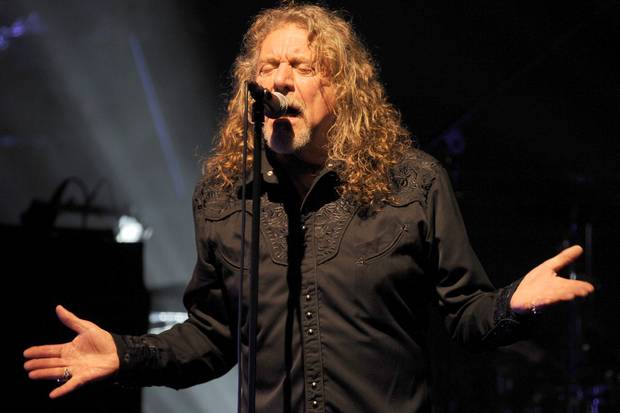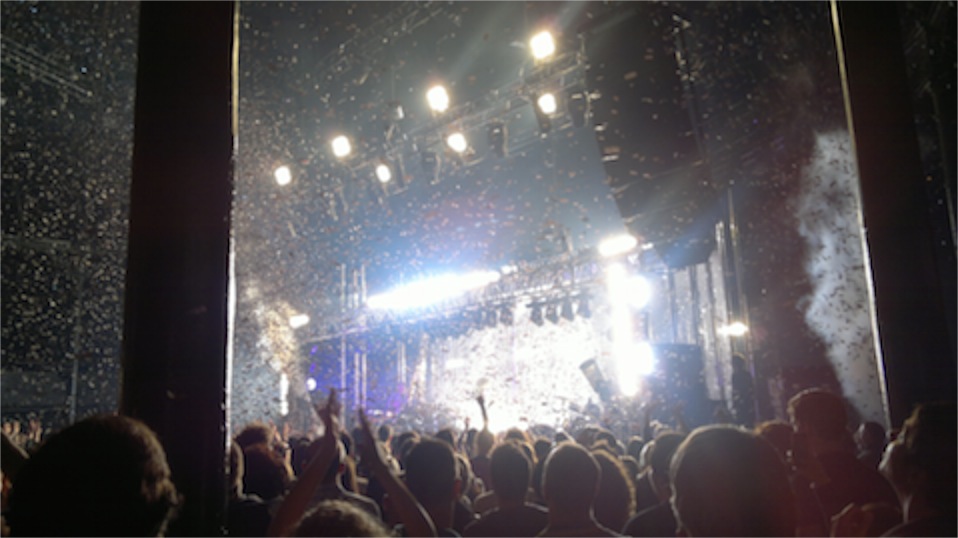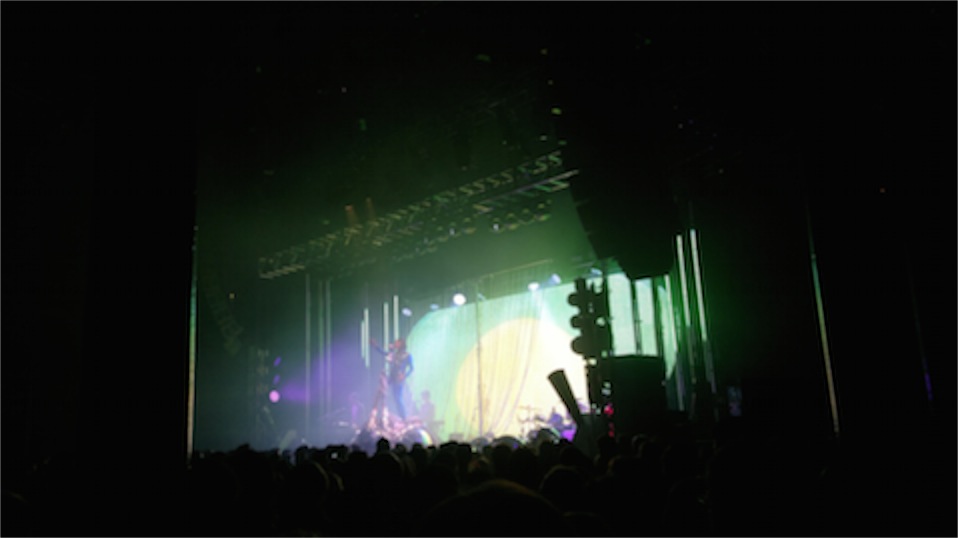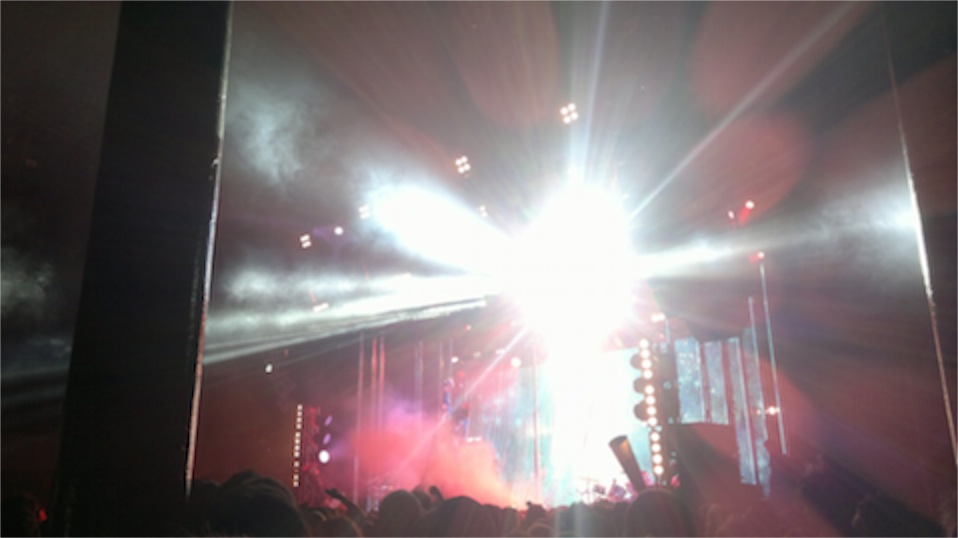Robert Plant and the Sensational Space Shifters :: The Roundhouse, Camden, 12-11-14

Startraks Photo/REX
Robert Plant, possibly the greatest rock singer of all time, and I go way back. I wish I could remember the exact moment I fell for him, like I can with Bowie, but in the mists of time I can only recall that it happened when he released Manic Nirvana in early 1990. In my evenings, after school, I was listening, on cassette, to New Kids On The Block’s Hangin’ Tough. I was still in the grip of that perfectly normal teen phase, which had started in early 1988, of liking the pretty boys and the pop music designed just for me. However, I was already a fan of more substantial music, due to my parents, by then. I was surely the only 13-year-old who could name 10 Dylan albums, watched Doors VHS tapes every weekend, rented Bowie’s movies obsessively (I had Glass Spider but it was the films that made me swoon) and knew who Robert Johnson was. And yet… and yet, I was in the grip of wanting to be some sort of normal teenager and the boybands had their hooks in. 1990 was the year it all changed. Manic Nirvana was the album that stole me away and set me on a path of seeing gigs that continues to this day. It grabbed hold of my NKOTB and Bros cassettes and threw them away because I was ready to move on.
Up to that point, Plant’s solo albums hadn’t quite registered in the old-fashioned rock world, which seems remarkable when you consider what a respected (and Album Of The Year Grammy-winning) solo performer he is today. Back then, everyone was just waiting around for him to reunite his old band; mind you, looking at the landscape of the questions he is still being asked, following the 2007 O2 reunion, you can see how little things have changed. Every week, it seems, there’s a story about how he’s turned down a truckload of cash to play soulless arenas and I love him a little more each time he talks about how little it interests him and then brushes it off with that West Bromwich charm. The man is just not bothered. He’s got a life to get on with and it doesn’t involve doing what everyone else craves so greatly.
When Manic Nirvana came out people were, frankly, surprised it was any good, as his solo output had been pretty average until then. He’d had a big solo hit with the of-its-time brilliantly awful, and comically named, Big Log (too many jokes to make) in 1983 and a trio of thoroughly average albums followed. In 1988 he released Now and Zen (as a pun connoisseur, that is a shocker) which was notable only for the excellent, and now dated, Heaven Knows, replete with overblown backing vocals and a brilliant solo (in the era of guitar solos) by Jimmy Page, the very same. But still, no cohesive whole album had made a dent. Manic Nirvana, at the time, was deemed to be a very good record, though when you listen now only a handful of tracks stand the test of time. What the album accomplished was to signal the beginning of a new career as a creditable solo artist, finally, a decade after LZ ended in a blaze of Bonzo’s alcoholism. My mum loved the album, so I did too. She must have suggested we go see him live; he was playing the Manchester Apollo that December, a few months after I’d started to wake up out of my boyband stupor (in August 1990 I saw Prince, Bowie and the Stones live in 23 life-changing days). She handed out homework to prepare me – don’t ask me why, but she put the vinyl of LZII into my hands. I can’t imagine why she picked that particular album to tell me to listen to, out of them all, but listen incessantly I did. When we saw him he actually did two songs from it; did she know that Ramble On and Living Loving Maid were coming? Impossible. I remember asking her: “Ma, do you think he’ll play Stairway?” I snort now with the notion. I didn’t know then about the two Plants. I call them pre and post the discovery of irony. (A digression: he’s had the nickname Percy since the 70s and my mum would never tell me why! As an adult, I found out that Percy was a movie starring Hywel Bennett about a man who gets a (huge) penis transplant! A rock magazine had run a pic of him in particularly snug and revealing trousers and captioned it ‘Robert “Percy” Plant’ and it stuck; always makes me smile now to think of it.)
You see, at some point between 1976’s Presence and 1979’s In Through The Out Door, Robert Plant realised he was ridiculous. He realised his band was ridiculous. And that travelling around in a private jet with mountains of coke, groupies, roadies getting favours for passes, endless thugs in security and smashed up hotel rooms were all ridiculous. Hammer Of The Gods and all that. The reasons why he woke up and saw the madness of the clichéd rock life that surrounded him are numerous, most likely derived from a combination of the loss of his son, the after effects of a bad car accident and the arrival of punk. That perfect storm of tragedy and the changing musical landscape had a marked effect on him and you can see it clearly in later LZ footage. The rock god poses struck came to be accompanied by smirks and winks; he’d clearly just become much more self-aware, self-knowing. By the time Zep were on their death knell, though they didn’t know it, at Knebworth in 1979, he was mentally out. He had been a Golden God, with his bare chest stuck out, circulation-cutting jeans and blond locks flowing, as he rescued a maiden from a castle. But he was done. A very smart man, he stopped wanting to play that part long before the hair metal understudies took over. So into the 80s he went, perm resplendent, and tried to escape the weight of being ¼ of a colossus that bestrode the planet. The 80s was a tough time generally for the old guard; Dylan, Bowie, Neil Young and many others all found themselves adrift. Manic Nirvana was the first sign of him finding his feet.
I love Led Zeppelin. Even though I don’t know what a single one of their songs are about (does anyone?) they are without doubt the most powerful and perfect rock band that has ever been. But, like Bowie, Plant had a bit of trouble in the 90s coming to terms with his legacy; he largely refused to play the so-called big songs (LZ released few singles so technically didn’t have many hits). And like Bowie, he got over it. What he does now is really what Dylan should be doing, instead of unintelligible, unrecognisable renditions coming at you via his cat-like nasal delivery (it’s just about charming, but only when you're at the front or in a small venue; seeing Bob in an arena with no screens – he refuses to have them – is frankly a shitty experience). Plant leaves the odd motif in and rewrites some of the song structure, but largely keeps the lyrical melody line intact. It makes for some nice surprises. So a song will begin and it’s familiar but you can’t put your finger on why and then he’ll start singing and this pure rush of joy will spread through the audience when everyone realises it’s Going To California.
As it happens, his new album …Lullaby and the Ceaseless Roar is very good indeed, for my money the best solo record he’s ever put out. So I was very much looking forward to hearing it performed live; anything else that came along would simply be a nice little bonus. Having watched his highly enjoyable Glastonbury performance (on telly, am too old for that tent shit now) in July I knew that I was going to get Whole Lotta Love. I was ready for it. A song like that is sewn into the fabric of being English and loving music. It exists like any Beatles song or Satisfaction or Life On Mars or Won’t Get Fooled Again (speaking of, they’re the only big rock band of that era I’ve never seen live: must fix that). So I’ve done ok with gigs, let’s face it. In nearly 300 shows, and counting, I’ve seen the Stones and CSN thrice, Macca twice, Bowie has passed my eyeballs and earholes 16 times, and I’ve even seen Ian Astbury fronting The Doors; a roster of everyone who’s been anyone in popular music of the last 50 years. When I saw Plant in 1990 he performed those two Zep songs but I don’t remember any further ones; history shows the night before in Newcastle he did Immigrant Song and Nobody’s Fault But Mine so it’s very possible I heard four but it was a long time ago. When I saw him at the Freddie Mercury tribute he did Queen songs (he did Innuendo like it was Kashmir (even sneaking in a couplet from that song to make the association clear) and Crazy Little Thing Called Love like the Elvis pastiche it is) and snuck in a little bit of Thank You (said to be Freddie’s favourite Zep song). I saw him again in 2000 in a small club in Manchester but he was on a covers tour, so did no original material at all. I didn’t care: I was on the front row. Last night, well, that was my first time really hearing Zeppelin songs and it was just as monumental, adrenalin-fuelled and emotional as you imagine.
I think my highlight of hearing him delve into that particular part of his history was What Is And What Should Never Be, which blew my mind. His voice is still powerful, strong and all that, but now because it’s lost range there’s much more emotion and nuance to it. He’s using it as a greater, but more careful, instrument than he has before, is learning more about his ability to interpret than ever before, and has certainly been finding new ways to convey his own musical loves. There’s a touch of Ralph Stanley here, a bit of Appalachian folk there, and a big slice of north west African rhythms, which go back a long way. His passion for Moroccan music and culture goes back to the 60s and he he performed at Mali’s Festival in the Desert in 2003. His fascination with Indian music is also well known – his and Page’s 1994 collaboration with Najma Akhtar (replacing the late Sandy Denny) on the Battle of Evermore is a joy to hear. His vocal style of the past couple of decades also undoubtedly owes a lot to Nusrat Fateh Ali Khan (who Jeff Buckley was famously obsessed with; his #2 obsession after, of course, Zeppelin). Then there’s his background as, frankly, a blues scholar; he knows his stuff and leads his brilliant band around a rip-roaring, heavy version of Bukka White’s Fixin’ To Die. Mention must go to the companions he uses to get the job done: what a fantastic collective they are, the Sensational Space Shifters. Playing a synthesis of African-influenced Celtic bluegrass folk blues, they’re partly made up of members of a former backing band of his, Strange Sensation. Liam Tyson from Britpop legends Cast and world music luminary Justin Adams lead the show on guitars. John Baggott on keyboards, Dave Smith on drums, Billy Fuller on bass and, perhaps the star of the show, Juldeh Camara complete the line-up. From the Gambia, Camara is known as a griot, a storyteller, and plays the riti, a one-stringed fiddle. You would not believe the range of noise and melody he coaxes from this deceptively simple instrument.
Plant acknowledges his past, takes the bits he wants, leaves the rest, and escapes from its weight with ease. I love him so very much for having less than zero interest in schlepping around some shitty arena in the Midwest playing Black Dog for the millionth time. You want to hear him sing a famous old rock tune? Go ahead. He ended the show with a drastically reworked version of Rock And Roll. It’s on his terms, take it or leave it.
He had opened the show with Friends from LZIII and I was knocked off my feet. The crowd, hoary old rock blokes mixed with old school rock chicks and, of course, some hipsters and students, loved every second of it. And by that I mean not just the old stuff but they were clearly familiar with the new album as well, and I find that to be quite something. How many heritage acts (ugh, horrible term, let’s think of something else) are releasing new material that’s resonating with audiences who look forward to hearing it live? Yes, Dylan and Cohen are putting out great albums but nobody (hardcore fans aside) wants to hear them live. They know what they want to hear and it ain’t Tempest. Plant still has priapic charisma to burn as well, and doesn’t mind at all being a bit of a crowd-pleaser. He’s relatable, seems down to earth and has shed his rock god aura. Mostly. There are moments when you do see the flash of it, the flash of former self, and you realise exactly who he is and what stages he has stood upon. And that only makes it all the more remarkable. It would be very easy to crave stadia adulation; frankly, most rock stars on his level do. I just paid £141 for a ticket to see Fleetwood Mac churn out Rumours at the O2: the ticket to see Plant was £43. He’s come from an era where albums were sold, meaning he’s got enough money, and he doesn’t seem to feel that need at all, which is hugely refreshing. He wants to play new songs to 3000 people. He doesn’t want to be a human jukebox for 150 quid a head. He played the Roundhouse 46 years ago, almost exactly. And back there again, there’s nowhere else he’d rather be, singing and banging a bendir drum during the interludes. Except perhaps Molineux on a cold Saturday afternoon.
Friends
Spoonful (Howlin’ Wolf)
Turn It Up
Going to California
Embrace Another Fall
Rainbow
What Is and What Should Never Be
No Place to Go (Howlin’ Wolf )
Babe, I'm Gonna Leave You (Anne Bredon)
Little Maggie
Fixin' to Die (Bukka White)
I Just Want to Make Love to You (Willie Dixon)/Whole Lotta Love/ Who Do You Love (Bo Diddley)
Encore:
A Stolen Kiss
Rock and Roll
The Flaming Lips :: The Roundhouse, London, 21-5-13

The problem with employing gimmicks in live concert performance is that you can come to a point where they’re expected and can somewhat take over. This was the situation found in Camden last night. True, the Flaming Lips have plenty that are quite endearing. The introductory lecture, where Wayne Coyne ambles on stage without fanfare to cheers, comes before the show starts, which is supposed to set ‘I’m the rock star but I’m not making a big entrance, look, it’s me, tuning my own instruments!’ against a backdrop of ‘I’m just like you, and vice versa, so let’s have a chat before we play anything’. It immediately puts the artist and the audience on an equal footing, being talked to so directly, as is Wayne’s way. I find it rather charming. But then, once the music starts, I just want to hear it. Never has the phrase ‘would you just get on with it and play something’ been said telepathically by so many people in the same room before.
The gig the night before had been postponed, due to his croaky throat, for which one must make allowances, though I’ve always thought that gruffness in the delivery was part of the attraction. I’ve seen the Lips twice before: once in the Troxy Ballroom, a tiny art deco bingo hall, and again at Alexandra Palace, a cavernous near-arena with many thousands of people. On both of those occasions, Wayne and the rest (the musical driving force, the amazing Steven Drozd, and the insanely brilliant drummer Kliph Scurlock) showed a keen sense of how to raise an audience up and keep them high, figuratively, and in some cases literally, given the pot smoke that permeates all Lips gigs. But it wasn’t clear what the purpose of this show was. It’s near the beginning of the tour for their new record, The Terror, and so these songs are at the beginning of their lives.
I’m now just making excuses – the new material (when they finally got to it) sounded powerful, the band is fantastic, but the visuals have come to overshadow the music. This would be fine if songs came at you, consistently, and you could take yourself away on the air of it all. But the first 2/3 of this show was just plain terrible. It got going, then it stopped, a song was played at glacial pace, and then, even worse, in between every single song was a rambling tribute to the restorative and evangelical power of music. Look, this guy ain’t no Springsteen. He isn’t even Bono. I like a bit of onstage banter, but not to the point where it sucks the energy out of the room. It’s self-indulgent. People really have come to hear music. Not a lecture. The opening pre-gig speech, which usually takes the form of a ‘health and safety’ briefing, was jettisoned for a more serious subject. The recent tornado in Oklahoma, their home, was occupying their thoughts. People listened reverently to his heartfelt monologue about the desire to create something special out of something as unimportant as a rock show, compared to such tragedy. That was fine, of course it was. But, later on, once the gig had begun, must we really hear several minutes of pontificating before each song on the nature of ‘people who want to tell us how to live’? It was tedious. And then, came Race for the Prize. It started with a tease, or so I thought. Keyboards filled the room, he sang the first line, and everyone went mad. This gig was about to take off.
Then, he sang the entire first verse, like a ballad, then the chorus, and then the second verse, and the chorus again. It's a great song, but nobody was permitted to sing with him, it just wasn’t possible. Everyone was fidgety – when was this actually going to kick in? Both previous times I’d seen them live they’d started with it and the place bounced. After he had sang the song’s contents, and several minutes (that is a long time when you’re waiting for something) had passed, the full band kicked in and everyone was thrilled. They played two rounds of the pre-first verse music… and then it ended. What the fuck? I mean, if you’re Prince, and you have 30 hits, you can afford to throw away a few on a medley or a new arrangement. If you have 5 famous songs, tossing one off is utterly unforgivable.
And then, just at the point where I was feeling embarrassed that my cousin was with me, our first gig experience together, he says ‘This is a David Bowie song’ and my heart did a little jump. Heroes, it was. Someone should play it live! The crowd grabbed onto it like thirsty travellers in a desert coming across a waterfall. It kicked off properly, and it was wonderful. It soared. From then, the pace picked up and the between song chats lessened. It was disappointing that it had taken an hour for this gig to get off the ground. All We Have Is Now from Yoshimi was stunning, Riding to Work in the Year 2025 from Zaireeka was awesome and Do You Realize?? was beautiful, a mass sing-along (though I felt relieved at its brevity, as when they’d played it at Ally Pally it took an eternity to end; it was trapped in an endless, dreary Hey Jude-esque repetition of the chorus that went on for what seemed like hours). Finally, the connection between band and audience felt restored. Wayne, who has taken to standing on a plinth 20 feet high, and cradling a plastic baby, looked emotional and touched by the response. He should have realised earlier that we want to connect with him too. It’s not just one way. He talked at us about life and music and we cheered. But we needed a chance to feed back.
We know the Lips need an editor, though I do admire their conviction in simply putting out the sounds that feel good to them rather than thinking the conventional ‘we must put out The Soft Bulletin #2’. The gig ended on a nice high, though without Yoshimi or Fight Test. Throughout, it was a feast for the eyeballs, with a stage-wide LED screen, tendrils of vertical cables with white light rushing up them, and two songs with raining confetti. But this is the problem with gimmicks. They’ve paid so much attention to the visuals they forgot the crowd came to hear music as well. If you’re going to try out your new record do it in a tiny club. The Roundhouse holds thousands (and is considerably bigger than the Troxy, where they put on a fantastic show) and didn’t deserve to be treated like a testing ground. You’d think from his position atop the pedestal he’d have seen the audience, standing like statues, waiting for something joyful to happen. But then again, he literally put himself on it, and that’s a metaphor that says far too much about Wayne Coyne’s level of self-worship. He is never happier than when he’s hearing the sound of his own speaking voice, giving us all a lesson in ‘how to stick it to The Man’. I don’t mind at all the lack of the animal costumes and the absence of the famed big inflatable ball. But I do mind that a person who constantly cries out to be connected, who tells the audience what amazing people we are, and how we can all achieve something if we do it together, showed no ability to actually plug into what his audience wanted.
Heroes brought the whole place together and I couldn’t help think of what mythical Beatles-level adoration there is now for Bowie. It was the best moment of the night, for everyone. The Flaming Lips don’t have a song as good as that in their arsenal, but they do have several that can form an unbreakable bond between band and audience. The new album bargain is to be clever about your setlist, but also put in your best tunes, and play them properly. Next time, I hope they realise that’s what people were crying out for.
Look...The Sun Is Rising
The Terror
The W.A.N.D.
Virgo Self-Esteem Broadcast
Silver Trembling Hands
Try to Explain
Race for the Prize
Butterfly, How Long It Takes to Die
You Lust
One More Robot
Sympathy 3000-21
"Heroes"
Riding to Work in the Year 2025 (Your Invisible Now)
Turning Violent
Do You Realize??
Encore:
All We Have Is Now
Always There, In Our Hearts


